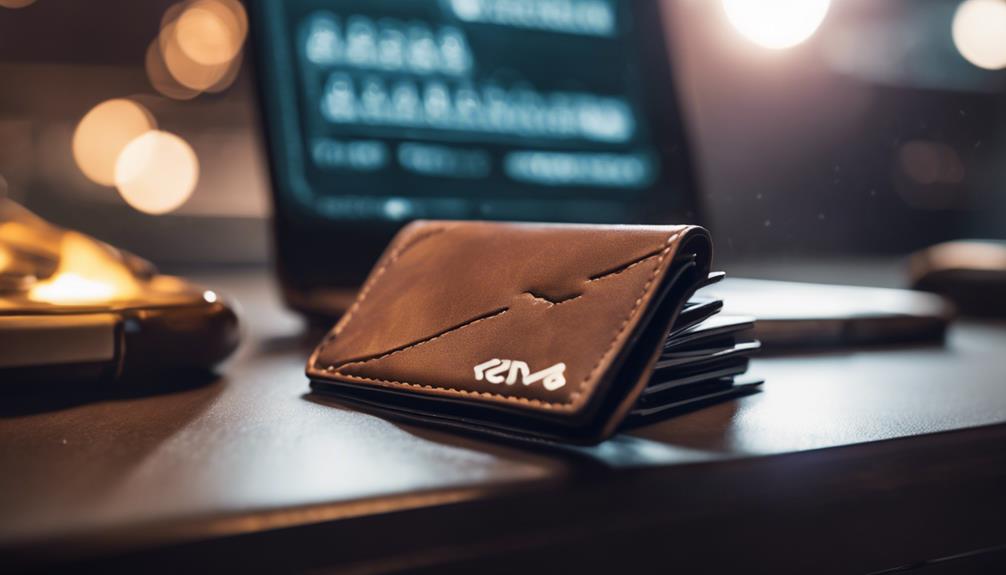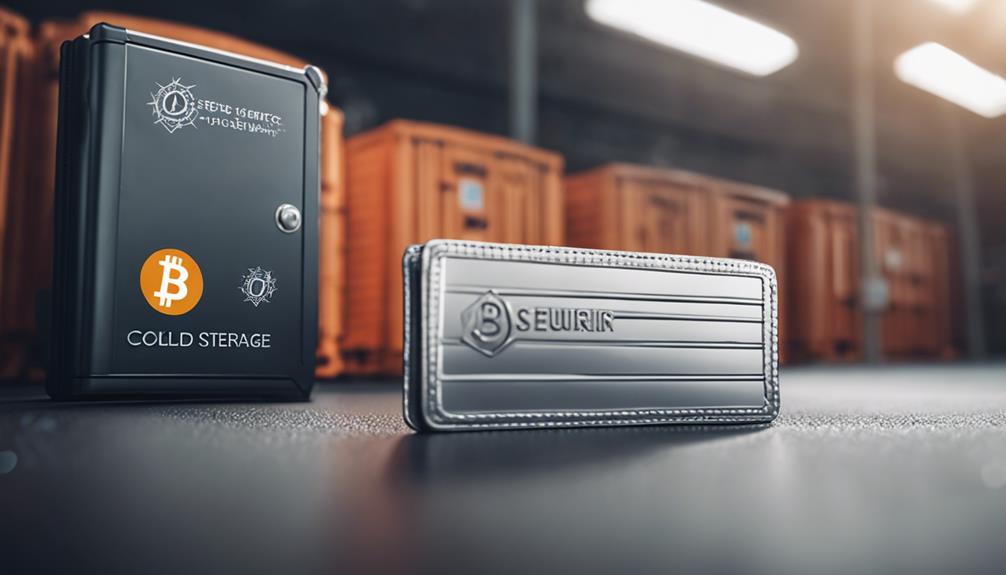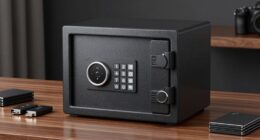In the world of Crypto IRA custodians, BitGo utilizes multi-signature wallets, cold storage, and regular security audits with $100 million insurance. Fireblocks focuses on institutional needs with MPC technology. Genesis Custody employs geographically dispersed key storage and compliance emphasis. Coinbase Custody relies on military-grade cold wallets, while Digivault offers both cold and hot storage options. These providers differ in security methods, from encryption practices to key protection protocols. Understanding these distinctions is crucial in making informed decisions for safeguarding your digital assets.
Key Takeaways
- BitGo employs multi-signature wallets and offers $100 million insurance coverage.
- Fireblocks utilizes MPC technology for institutional-grade security.
- Genesis Custody uses geographically distributed key storage for compliance.
- Coinbase Custody relies on military-grade cold wallets for security.
- Digivault provides secure cold and hot storage solutions for assets.
BitGo's Security Measures

BitGo employs a robust multi-signature wallet system and offers $100 million in insurance coverage for digital assets held in cold storage as part of its extensive security measures.
By utilizing a multi-signature approach, BitGo enhances the security features of its platform, requiring multiple keys to authorize transactions, thereby reducing the risk of unauthorized access to digital assets.
The inclusion of cold storage further strengthens the protection of digital assets by keeping them offline and out of reach from potential cyber threats. This method guarantees that the assets are not susceptible to online hacks or breaches, adding an extra layer of security for investors.
BitGo's commitment to security is evident in its continuous security audits and its impeccable track record of no security breaches since its inception in 2013. These stringent security measures not only meet the requirements of institutional investors but also align with the standards set by regulatory bodies, providing a secure environment for digital asset storage and transactions.
Fireblocks' Custodial Solutions

Fireblocks stands out in the cryptocurrency custodial space by providing enterprise-grade infrastructure tailored to meet the secure custody needs of institutional investors. The platform guarantees the safe storage and transfer of digital assets through cutting-edge technology, providing peace of mind to clients.
Key features of Fireblocks' custodial solutions include:
- Robust Security Measures: Fireblocks is known for its strong security protocols, safeguarding assets from hacking and unauthorized access.
- Multi-Party Computation Technology: By employing this advanced technology, Fireblocks enhances the security of its cold storage solutions, further protecting clients' funds.
- Focus on Institutional Needs: With a specific focus on catering to institutional investors, Fireblocks is a trusted custody provider in the cryptocurrency space, offering tailored solutions for the secure management of digital assets.
Comparison of Storage Solutions

When evaluating storage solutions in the cryptocurrency custodial sector, it is essential to consider the distinctive security features and operational strategies offered by industry leaders. BitGo, a prominent player, provides a blend of hot and cold wallets fortified with advanced security measures, such as multi-signature technology, ensuring top-notch security for crypto custodians.
Fireblocks stands out by offering enterprise-grade infrastructure supported by MPC technology, enhancing the safety of digital assets stored in its systems.
Genesis Custody takes a geographically distributed approach to key storage and secures funds with A-rated solutions, prioritizing excellent security measures for institutional investors.
Coinbase Custody opts for military-grade cold wallets and conducts regular audits to maintain the safety of institutional assets under its care.
Digivault, catering specifically to institutional businesses, offers a mix of secure cold and hot storage solutions, further emphasizing the importance of robust security protocols within the crypto custodial space.
Institutional Investor Protection Strategies

In the domain of safeguarding digital assets for institutional investors, prioritizing robust security measures provided by trusted custodians is paramount. When it comes to institutional investor protection strategies in the area of digital currency, secure storage, and investment decisions, there are key considerations to keep in mind:
- Thorough Due Diligence: Institutional investors must conduct thorough due diligence on custodians like BitGo and Fireblocks to confirm they meet stringent security standards and offer the necessary protection for digital assets.
- Risk Management Protocols: Implementing robust risk management protocols is essential for safeguarding investments in digital currency, especially when entrusting custodians with secure storage solutions.
- Continuous Monitoring: Institutional investors should consistently monitor the security measures implemented by custodians to stay informed about any updates or changes that may impact their investment decisions.
Evaluating Digital Asset Safeguards

In the domain of institutional investor protection strategies concerning digital currency, a pivotal aspect lies in the thorough evaluation of digital asset safeguards provided by leading custodians like BitGo and Genesis Custody.
BitGo implements multi-signature technology and robust security protocols to secure digital assets in cold storage, ensuring the safety of retirement funds entrusted to them. On the other hand, Genesis Custody strategically stores keys in geographically dispersed locations to reduce the risk of single-point vulnerabilities in digital asset storage, offering a secure solution for Trust Companies and cryptocurrency exchanges seeking reliable custodial services.
By prioritizing security measures like cold storage, multi-factor authentication, and compliance with regulatory standards, these custodians, including Kingdom Trust and Gemini, establish a safe environment for storing cryptocurrencies, instilling confidence in investors entrusting their retirement savings to these reputable firms.
The emphasis on safeguarding digital assets underscores the commitment custodians have towards protecting investors' funds in the volatile landscape of digital currency investments.
Security Protocols of Top Custodians

Security protocols of top custodians play a vital role in safeguarding digital assets. Encryption methods used by custodians and the implementation of multi-factor authentication are key components in ensuring the security of cryptocurrency investments.
Understanding these security measures is essential for investors looking to protect their assets in the rapidly evolving landscape of digital currencies.
Encryption Methods Used
Utilizing advanced cryptographic techniques, top crypto IRA custodians employ sophisticated encryption methods to secure digital assets and protect against unauthorized access. These methods include:
- BitGo utilizes multi-signature technology with 3 keys for each wallet, ensuring secure transactions.
- Fireblocks employs MPC (Multi-Party Computation) technology for secure key management and transaction approval.
- Genesis Custody utilizes hardware security modules (HSMs) to safeguard cryptographic keys and protect against unauthorized access.
These encryption methods, combined with hardware wallets and other security measures, contribute to the overall robust security infrastructure of these custodians, offering peace of mind to investors looking to safeguard their cryptocurrency investments for retirement.
Multi-Factor Authentication Employed
A key aspect of the security protocols implemented by top crypto IRA custodians involves the deployment of robust multi-factor authentication measures to bolster account security for investors.
BitGo employs biometric scanning and hardware security keys, while Fireblocks utilizes SMS verification, email confirmation, and hardware token authentication.
Genesis Custody implements time-based one-time passwords (TOTP) and biometric authentication, and Coinbase Custody requires multi-factor authentication for all logins, offering SMS, authenticator apps, or hardware keys.
Kingdom Trust enforces multi-factor authentication for account holders, combining password protection with additional verification steps.
These measures enhance the security of digital asset class investments within their storage solutions, providing investors with added peace of mind regarding the safety of their cryptocurrency holdings.
Cold Vs. Hot Wallet Security

Cold wallets, being offline storage solutions for cryptocurrencies, provide enhanced security by isolating private keys from online vulnerabilities. This segregation considerably reduces the risk of unauthorized access and cyber theft. In contrast, hot wallets, which are online storage options, offer quicker access to funds but are more susceptible to hacking and cyberattacks due to their constant connection to the internet.
- Cold wallets are ideal for long-term storage of crypto assets, safeguarding them against cyber threats and unauthorized access.
- Hot wallets are convenient for frequent trading activities, allowing quick access to funds for trading purposes.
- Multisignature technology, commonly used in cold wallets, requires multiple private keys to authorize transactions, adding an extra layer of security to the storage of crypto assets.
Enhancing Trust in Crypto Custody

When discussing the points of enhancing trust in crypto custody, it is essential to focus on two key aspects: security technology overview and regulatory compliance standards.
These aspects play a pivotal role in instilling confidence among institutional investors in the safety of their digital assets. By understanding the security measures and adherence to regulations implemented by custodians like BitGo and Fireblocks, investors can trust in the reliability of crypto custody services.
Security Technology Overview
Utilizing advanced technologies such as Multi-Party Computation (MPC) and military-grade encryption, top crypto IRA custodians bolster their security measures to instill confidence in their custody services. These technologies play an important role in safeguarding digital assets against potential threats.
To enhance security further, custodians often employ a combination of methods, including:
- Implementing hardware security modules (HSMs) for secure key management.
- Utilizing cold storage solutions to store cryptocurrencies offline, minimizing online exposure.
- Employing military-grade encryption to protect sensitive data and transactions effectively.
Regulatory Compliance Standards
Adhering to strict regulatory compliance standards is paramount for establishing trust in the domain of crypto custody services.
Custodians handling retirement accounts in the US must meet stringent regulatory requirements set by the IRS and the Department of Labor. Entities like Kingdom Trust prioritize compliance with Employee Retirement Income Security Act (ERISA) guidelines to safeguard retirement assets effectively.
Meeting the highest level of compliance standards, custodians also adhere to SEC regulations concerning custody of securities and recordkeeping, catering to both institutional and individual investors.
Additionally, custodians must uphold Anti-Money Laundering (AML) and Know Your Customer (KYC) protocols to prevent illicit activities and ensure proper client identification.
Frequently Asked Questions
Who Is the Biggest Crypto Custodian?
The largest crypto custodian, with regards to total assets under custody and market influence, is currently BitGo.
With a significant minimum account value requirement of $1 million USD and support for over 300 cryptocurrencies, BitGo stands out as a leading choice for institutional investors seeking secure custody solutions for their digital assets.
Its robust infrastructure and broad coin support contribute to its prominence in the crypto custodian space.
What Is the Best IRA for Crypto?
When considering the best IRA for crypto, it is essential to prioritize security measures such as cold wallets and multi-signature technology. Top custodians guarantee compliance with regulatory standards and offer insurance coverage against potential losses.
Investors should weigh factors like fees, account minimums, and asset diversity. Evaluating the reputation, track record, and security protocols of custodians is vital in selecting the best crypto IRA provider.
What Are Bitcoin IRA Fees?
Bitcoin IRA fees typically encompass account setup fees, monthly maintenance charges, and transaction costs. These fees can fluctuate based on the custodian chosen, with some imposing a percentage fee on assets managed. Additionally, ancillary charges might be applicable for services such as trading, storage, and account closure.
It is imperative to scrutinize the fee structures of various Bitcoin IRA custodians to make an informed decision. Lower fees may not always correlate with superior service, necessitating a holistic evaluation of the custodian's value proposition.
What Is the Minimum Deposit for a Bitcoin Ira?
The minimum deposit for a Bitcoin IRA can vary greatly among custodians, typically ranging from $1,000 to $10,000.
Some providers, like BitGo, may require a minimum account value of $1 million USD for their services, while others, such as Fireblocks, may have different minimum deposit requirements based on the account type chosen.
It's essential for investors to research and compare various custodians to find one that suits their investment objectives and financial capabilities.
What Security Measures Do Top Crypto IRA Custodians Like BitGo and Fireblocks Have in Place?
BitGo and Fireblocks, as trustworthy custodians for crypto IRA, have robust security measures in place. BitGo offers multi-signature wallets and cold storage, while Fireblocks utilizes MPC technology and hardware security modules. Both custodians have strict compliance and audit processes to ensure the safety of clients’ digital assets.
Conclusion
In the world of crypto IRA custodians, security is paramount to safeguarding digital assets. Just as a fortress protects its treasures, top custodians like BitGo and Fireblocks employ robust security measures to guarantee the safety of investors' funds.
By comparing storage solutions, evaluating safeguards, and enhancing trust in custody services, investors can make informed decisions to safeguard their retirement investments in the volatile crypto landscape.









